Live Information Stream
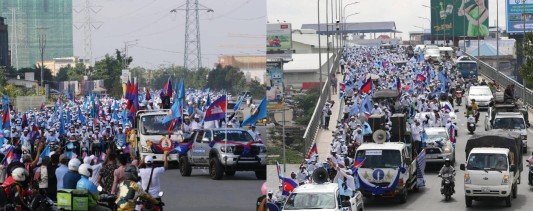
Cambodian People's Party (left) and Candlelight Party campaign in Phnom Penh on 3 June 2022 ahead of Sunday's commune elections.
Welcome to LICADHO’s live coverage of Cambodia’s fifth commune elections. We’ll be bringing you updates as polls open at 7am on Sunday. Join us here to follow events as they unfold.
Polls are Open
Polling stations around the country have just opened. Voters will be able to vote from 7am, with polls closing at 3pm, after which votes will be counted at the polling stations where they were cast. Follow our live human rights updates here.
Electing Commune Chiefs and Councils
Cambodia held its first commune elections in 2002, with local polls taking place every five years since. Voters participating in commune elections select a party, each of which prepares a list of ranked candidates to occupy seats on the commune council. The number of seats in each council varies across the country’s 1,652 communes, or sangkats in urban areas. The party with the most votes in each commune earns the commune chief position, while the remaining council seats are distributed proportionately based on a formula that considers each party’s vote share.
Political Landscape for 2022 Commune Elections
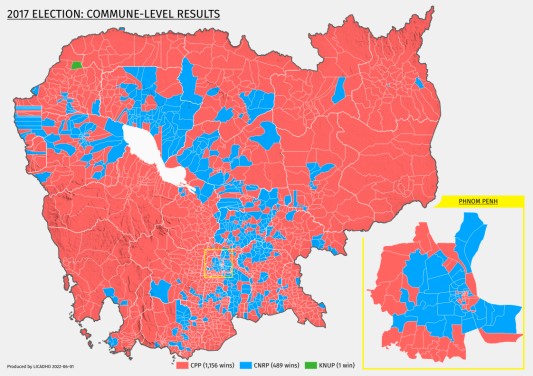
In the last commune elections in 2017, the ruling Cambodian People’s Party (CPP) won 1,156 commune chief seats, while the opposition Cambodia National Rescue Party (CNRP) won 489 top spots. Shortly after, the CNRP was dissolved by the Supreme Court; the party’s president, Kem Sokha, was arrested and charged with treason, an ongoing trial that held hearings just last week; and more than one hundred of its leaders were banned from politics, with many facing other convictions and entering exile. In addition, the party’s 489 commune chiefs – along with more than 5,000 CNRP councilors elected across the country in 2017 – were removed from their positions and replaced by the ruling party.
Honoured to meet with H.E. Kem Sokha to discuss the current events in Cambodia and check up on his wellbeing.
— Canada in Cambodia (@CanadaCambodia) June 3, 2022
Canada supports free and fair elections and fully independent pluralistic parliamentary democracy.
Canada continues to closely watch his unduly delayed trials pic.twitter.com/raKPuIWLYA
Election ‘still falls short’ of democratic standard: ANFREL
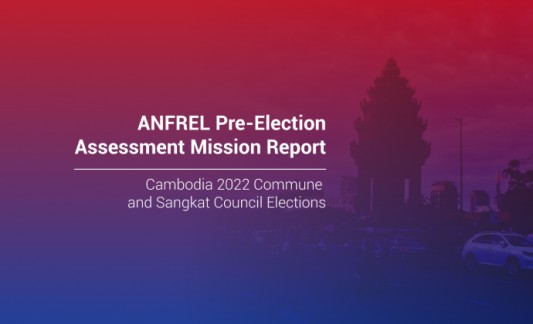
The Asian Network for Free Elections (ANFREL) released a pre-election assessment report for the commune election, finding that there “will be no genuine and legitimate election outcome as long as threats against the opposition and civic society remain prevalent”, and that “Cambodia still falls short of the standard of democratic elections”.
It also notes that the participation of CSOs in elections is “minimal”, largely due to repressive legislation such as the Law on Associations and Non-Government Organizations (LANGO) and a lack of international funding.
Political Activists in Prison, Sidelined from Election
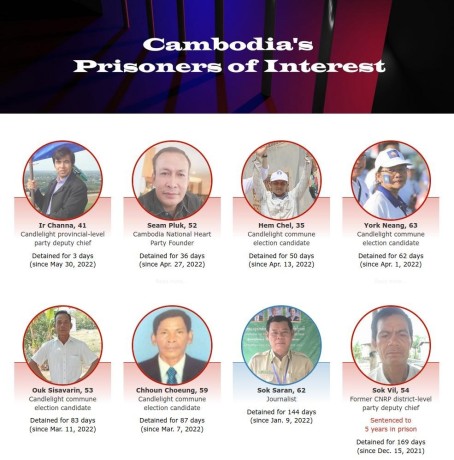
LICADHO’s Prisoners of Interest page lists that at least 38 political activists are in prison as the country goes to the polls today, completely barring them from participating in the election. Five Candlelight members have been detained this year, including four commune election candidates. The latest arrest – which saw Candlelight’s deputy chief in Takeo province detained and charged with plotting – was just a few days ago.
Also behind bars is the founder of the Cambodia National Heart Party, who was arrested in April 2022 on allegations of forgery while trying to register the party. His party is not running in today’s election as the Ministry of Interior rejected their registration application last year.
These political opponents have joined dozens of former CNRP members behind bars, including former commune chiefs and commune councilors who were elected in 2017. Twenty-five political activists have already spent more than a year in prison, and some have convictions that won’t see them released until after the national elections next year.
Pre-Election Coverage: What to Read as Cambodia Votes
As Cambodians begin to vote today, here are stories that set the scene and provide context for today’s election.
- Reuters – "Cambodian opposition rises from the ashes ahead of local elections" by Prak Chan Thul (1 June 2022)
- Associated Press - "Cambodians vote in local election amid intimidation, threats" by Sopheng Cheang (4 June 2022)
- Radio Free Asia - "Cambodians to vote in local commune council elections Sunday" (3 June 2022)
- Al Jazeera – "‘We’re back’: Cambodia’s embattled opposition hopes for revival" by Andrew Haffner (3 June 2022)
- VOA – "How Cambodia’s 2017 Commune Elections Were a Turning Point for Democracy" by Sun Narin (16 May 2022)
- Nikkei Asia – "Cambodia's reborn opposition under pressure ahead of local polls" by Shaun Turton and Bopha Phorn (30 May 2022)
As of 9:15am, LICADHO has received reports of local authorities lingering in or in front of polling grounds in nine provinces. In many cases they've been seen noting the names or number of voters. Reports come from:
- Banteay Meanchey
- Kampong Speu
- Kampot
- Koh Kong
- Phnom Penh
- Siem Reap
- Svay Rieng
- Takeo
- Tbong Khmum
Updated at 10:52 ICT
Contesting Parties
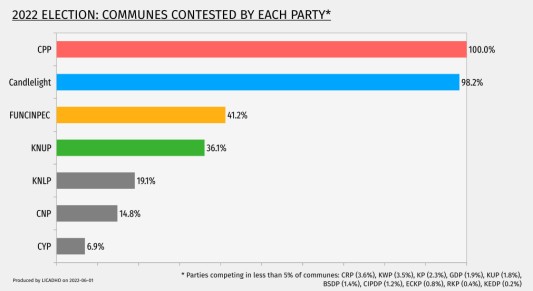
Seventeen parties are contesting today’s commune election. Only the ruling CPP is fielding candidates in all of the country’s 1,652 communes. The Candlelight Party, formerly the Sam Rainsy Party, surprised many with its resurgence in recent months. The party is the second largest party competing for seats today, with candidates in all but 29 communes.
Other parties are vying for seats in four to over 600 communes each. They are: FUNCINPEC, Khmer National United Party, Cambodia National Love Party, Cambodia Nationality Party, Cambodian Youth Party, Khmer Will Party, Cambodia Reform Party, Kampucheaniyum Party, Grassroots Democratic Party, Khmer United Party, Beehive Social Democratic Party, Cambodia Indigenous People’s Democracy Party, Ekpheap Cheat Khmer Party, Reaksmey Khemara Party, and Khmer Economic Development Party. To read more about parties competing, visit VOD’s “Guide to Political Parties Contesting the 2022 Commune Elections”.
The Campaigns
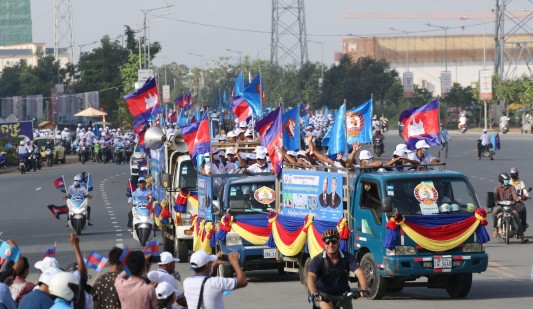
CPP supporters rally in Phnom Penh on 3 June 2022
Parties took to the streets during the official two-week campaign period, which ran from 21 May to 3 June.
As parties are allowed to hold two rallies in each commune during the campaign period, the first and final days of the campaign period saw the largest turnouts. Tens of thousands of people went to campaign and march in the capital, with most supporters going to CPP or Candlelight rallies. Similar rallies at smaller scales were seen across the country.
Reports of irregularities and violations rolled in daily throughout the campaign period. Rallies, events and monitors were regularly under surveillance, while opposition party signboards and logos were removed or destroyed in several provinces. A monk was evicted from his pagoda for supporting Candlelight; there were arrests and violence against several Candlelight candidates reported; and consistent reports came in of local authorities threatening to revoke IDPoor cards based on political affiliation, which would limit people’s access to social support.
A range of tactics were also used to sway voters. Some voters were given cash or small gifts, while many cars with state license plates or no license plates were seen participating in campaign rallies.
How to run the commune election campaign by the CPP https://t.co/GuOZfYFYqp pic.twitter.com/Ms6ZWTA5sf
— Noan Sereiboth (@noansereiboth) May 22, 2022
Generals on the Campaign Trail
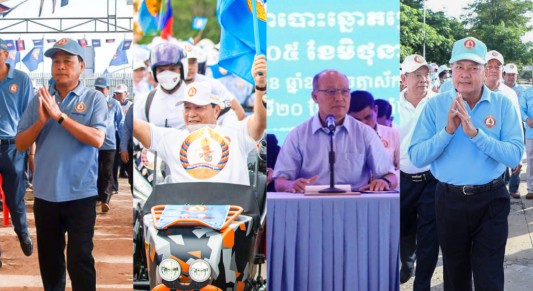
From left to right: RCAF Commander-in-Chief Gen. Vong Pisen, RCAF Chief of Joint Staff Gen. Eth Sarath, National Gendarmerie Commander Gen. Sao Sokha, and National Police Chief Gen. Neth Savoeun
Cambodian armed forces have long been criticized for their lack of independence, with virtually all senior commanding officers appointed members of the ruling party’s central committee. While in the past members of Cambodia’s armed forces were required to be politically neutral, more recent amendments to the laws governing commune elections have since eroded this provision, allowing members of the Royal Cambodian Armed Forces (RCAF) and National Police to participate in campaigns provided they do so while taking time off from their official duties.
This was on full display on social media during this year’s campaign period, with the top brass of RCAF, the National Police, and the Gendarmerie posting about their campaign activities and on-duty activities in alternating posts on their personal Facebook pages.
While the legal framework is permissive, RCAF and National Police members are prohibited from making any public statement in support of a political party or candidate while on duty. Several armed forces units have used their official Facebook accounts to issue public statements urging support for the ruling CPP during the campaign period.
Armed forces involvement in elections has not stopped at campaigning. In recent elections, civil society observers noted an increase in deployment of military units to vote in highly contested constituencies, despite them often having no legal right to vote in those communes. During the last national election in 2018, thousands of soldiers from Oddar Meanchey and Preah Vihear provinces were moved into polling stations in Siem Reap province, where growing popularity for the opposition had been seen in 2013 and 2017, and similar movements have been observed in 2022.
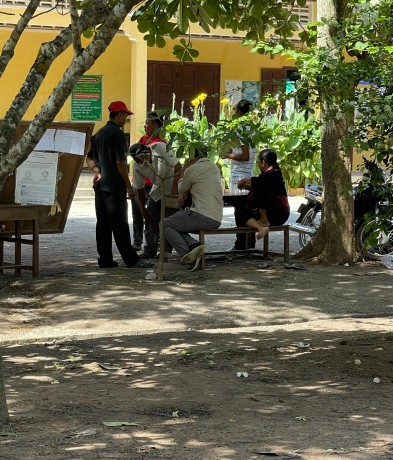
Local authorities sitting inside polling grounds this morning.
LICADHO has received reports from 16 provinces of local authorities – village, commune or district chiefs, as well as other authorities – lingering in or in front of polling grounds and/or transporting people to polling stations. In many of these cases, authorities were seen recording the names or number of people who went to vote. In one case, a village and deputy village chief were observed sitting outside the main entrance of the polling grounds and requiring voters to tell them their name after voting.
There have also been isolated reports of local authorities going house-to-house to ask who has voted, and of armed soldiers standing near polling grounds.
The 16 provinces are:
- Banteay Meanchey
- Battambang
- Kampong Chhnang
- Kampong Speu
- Kampong Thom
- Kampot
- Kandal
- Koh Kong
- Oddar Meanchey
- Phnom Penh
- Prey Veng
- Pursat
- Siem Reap
- Svay Rieng
- Takeo
- Tbong Khmum
Updated at 11:59 ICT
As Cambodians are casting their ballots across the country to elect their local leaders, legally-embattled opposition leader Kem Sokha isn't going to vote "because there is no option for him to choose", his aide Muth Chantha told @VOAKhmer's @MonoKhanS. pic.twitter.com/ekEFA5E8nc
— Chhengpor Aun (@aunchhengpor) June 5, 2022
VoA reporters Aun Chhengpor and Sokummono Khan share that former opposition leader Kem Sokha, who is still on trial for treason and attended court hearings last week, will not vote in today's commune elections.
Sokha was the co-founder of the dissolved opposition party, the CNRP, and his arrest in November 2017 precipitated the CNRP's dissolution. He remains barred from conducting political activity.
Election Monitors Overwhelmingly from Government-aligned Groups
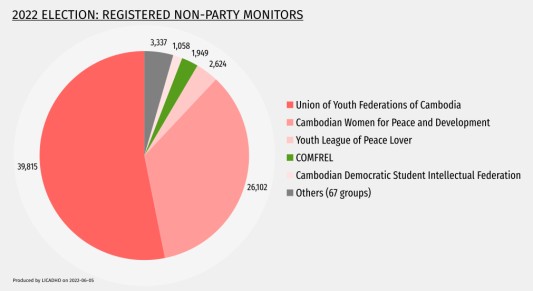
Registered election monitors have spread out across the country today to oversee ballots being cast and counted, yet the vast majority of non-party observers are from organisations led by high-ranking government officials.
The National Election Committee yesterday released the final tally of election monitors from organisations, listing 72 groups who have collectively registered 74,885 monitors to cover the 23,602 polling stations across the country. Yet 93% of non-party monitors are registered by just four government-linked groups.
- 39,815 monitors – more than half – are registered by the Union of Youth Federations of Cambodia, a group led by Hun Many, a Kampong Speu ruling party lawmaker and the prime minister’s son.
- 26,102 monitors are registered by Cambodian Women for Peace and Development, an organisation led by Deputy Prime Minister Men Sam An.
- 2,624 monitors are registered by the Youth League of Peace Lover, whose honorary president is Chum Kosal, an advisor of the prime minister.
- 1,058 monitors are registered by Cambodian Democratic Student Intellectual Federation. San Visal, the group’s Secretary-General, is also a Secretary of State with the Ministry of Rural Development.
The Committee for Free and Fair Elections in Cambodia (COMFREL), an independent watchdog, has registered 1,949 monitors. The remaining 67 groups have each registered smaller numbers of monitors. For more information on the above groups, read VOD’s “Gov’t-Linked Groups Dominate Election Observer Registrations”.
Phil Robertson, Deputy Asia Director at Human Rights Watch, noted the overwhelming number of pro-government monitors.
For #Cambodia commune elections today (5 June), the NEC says there are 74,885 "election observers" deployed. Too bad that fully 93% of them are from pro-gov't GoNGOs, including groups connected to @PeacePalaceKH PM's son Hun Manith & DPM Mem Sam An. Still far from "free & fair"! pic.twitter.com/4aYc2mL6ex
— Phil Robertson (@Reaproy) June 5, 2022
UN, International Observers Take a Step Back
— United Nations in Cambodia (@UNCambodia) May 25, 2022
The United Nations has noted that it is not involved in “assisting, organizing or observing” this year’s commune elections, and has called on the government and stakeholders to “create an environment conducive to peaceful and credible elections.”
@ptamesis UNRC in #cambodia conveyed, “As Cambodians prepare to take part in the #CommuneCouncilElection on 5 June 2022, I call on all stakeholders to ensure that the polls are conducted in a peaceful, inclusive, genuine and credible manner,...” pic.twitter.com/0F1gcVyqw0
— United Nations in Cambodia (@UNCambodia) June 3, 2022
The European Union is also not deploying monitors this year. The US and EU reversed their plans to fund the National Election Committee following the dissolution of the CNRP in 2017. The EU noted in a statement at the time that the removal of CNRP commune councilors “denies the choice of those who voted for the party” in the 2017 election.
Candlelight district party official arrested
Preliminary reports indicate that a Candlelight district party official in Kandal, Ean Pov, was arrested at Wat Chambok School, a polling ground in Peuk commune, Ang Snuol district, at around 12:00pm today. He is currently being detained at the district police station. Reason(s) for the arrest are unclear.
‘Intimidation’ Highlighted by UN, European Parliament, APHR
On 2 June, a spokesperson for the UN Office of the High Commissioner for Human Rights noted a "pattern of threats, intimidation and obstruction targeting opposition candidates", part of a trend of closing space in the country in recent years.
.@UNHumanRights spokesperson @LizThrossell on #HumanRights concerns ahead of local #elections in #Cambodia on Sunday: "We are disturbed by the pattern of threats, intimidation and obstruction targeting opposition candidates". See full comment: https://t.co/yRgnmhDJkB pic.twitter.com/rWiUMABbw0
— UN Human Rights Cambodia (@OHCHR_Cambodia) June 2, 2022
Last month the European Parliament passed a resolution which expressed “deep concern over the backsliding on human rights” in light of elections. It called for the European Commission to “use all tools available”, including the complete suspension of Cambodia’s Everything But Arms (EBA) trade preferences and other sanctions, if there is evidence of unfair elections.
ASEAN Parliamentarians for Human Rights (APHR) on Friday shared that is it “impossible to hold free and fair elections in an ongoing climate of persecution against the opposition”. They called for Cambodia’s neighbours and the international community to “put pressure on Hun Sen and his government to take Cambodia back into a democratic path.”
Read also our recent statement on the campaign of harassment and intimidation to which the opposition in #Cambodia has been subjected during the electoral campaign. https://t.co/UNwCqubJJ1
— APHR (@ASEANMP) June 5, 2022
Updated at 13:39 ICT
Women Candidates Underrepresented
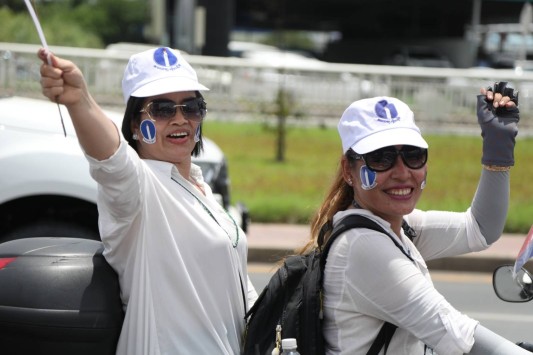
Candlelight supporters join a rally in Phnom Penh on 3 June.
Women make up over half of registered voters, yet only 28% of candidates contesting today’s election are women (14,839 women out of 53,411 candidates). CPP and Candlelight are fielding 26% and 23% women candidates, respectively.
A range of factors make it harder for women to enter politics, including discrimination; unequal economic opportunities; care work; lack of support from husbands, families and communities; fewer role models; and gender norms. Just 17% of elected commune council members were women following the 2017 commune election.
The party list system also blocks many women from being elected. During elections, people vote for a party, with the party ranking their own candidates. The top-ranked candidate stands for the position of commune chief and others are in line for deputy chief and other councilor seats. Often, parties select men over women for these top spots, leaving fewer women elected.
Informed by her experience with domestic violence and discrimination, a Takhmao city commune-chief candidate is hoping to upset the ruling party’s streak, pledging to change the culture of commune politics. https://t.co/MBLXahgrBw
— VOD English (@VOD_English) May 30, 2022
Dissolving competition, commune by commune
In the final days of the candidate registration period, the National Election Committee held a series of hearings in which it nullified entire commune candidate lists from the Candlelight Party. The rejections were based on a few individuals spontaneously alleging illiteracy, a claim NEC then used to argue the overall commune candidacy list was tainted, thus disenfranchising those candidates from participating in the election.
Candlelight was ultimately barred from taking part in today’s election in 11 communes:
- Phnom Penh: Kbal Koh, Preak Liep, Phsar Damkor, Monorom, O Russei 1, O Russei 2, Phsar Depot 1, and Tuol Svay Prey 1 communes;
- Kampong Cham city: Boeung Kak and Kampong Cham communes;
- Pursat: Kandieng commune.
These decisions by the NEC have led to a number of constituencies - six in Phnom Penh, two in Kampong Cham, and one in Pursat - in which the ruling party is now the only option listed on the ballot. According to VOD, 24 communes across the country only have CPP candidates running.
Polls are closed
Polls are closed, while voters who are waiting in line in front of polling stations will still be able to cast their ballots. Today’s election saw numerous reports across 16 provinces of local authorities lingering at polling stations, recording names of voters, transporting voters to polling grounds, and/or going to peoples’ houses to tell them to vote. One Candlelight district party official was arrested at a polling station in Kandal province for unclear reasons.
Counting of ballots at each polling station will begin shortly, and preliminary results are expected to trickle in this afternoon and evening, with results coming in until midnight tonight and then resuming tomorrow at 8:00am. The official results will be released on 26 June 2022.
Ean Pov, Candlelight's deputy party chief of Ang Snuol district, was released at about 2:30pm. He had been arrested several hours earlier at a polling ground in Peuk commune, Ang Snuol district, Kandal province.
Updated at 15:17 ICT
Commune Council Responsibilities
Commune chiefs and councils are responsible for providing public services and administering a range of documents for their constituents, such as birth, marriage and death certificates; residency and family books; rental agreements; and other documents. They play a role in managing local budgets, overseeing infrastructure improvements, and determining which residents qualify for social assistance under the IDPoor scheme.
Commune councilors also vote alongside National Assembly members to elect most of the country’s senators. The last Senate Election was in 2018, after the CNRP’s dissolution and the removal of the party’s commune councilors, resulting in the ruling CPP capturing all available Senate seats.
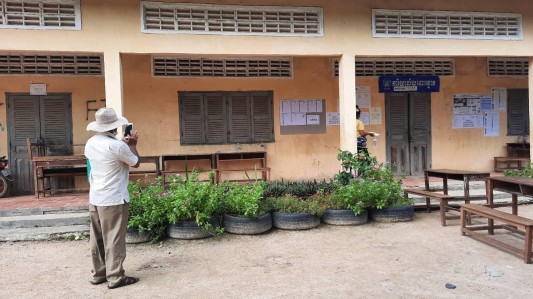
A polling station in Takeo province closed its doors and windows shortly after 3:00pm.
Polling station chiefs at several polling grounds in at least nine provinces closed polling ground gates or shut the doors and windows of polling stations after polls closed at 3:00pm. In most cases, this prevented people who were not accredited as election observers from viewing the vote counting process.
Provinces with reported incidents include:
- Banteay Meanchey
- Kampong Cham
- Kampong Chhnang
- Kandal
- Kep
- Phnom Penh
- Pursat
- Svay Rieng
- Takeo
National Election Committee's President Prach Chan puts turnout rate of #Cambodia commune elections at 77.91% with Some 7,172,448 out of 9,205,681 registered voters went to vote. #PoliticsKH pic.twitter.com/cUFAG8vAo5
— Chhengpor Aun (@aunchhengpor) June 5, 2022
NEC President Prach Chan reported a voter turnout of 77.91% across the country, as shared by VOA journalist Chhengpor Aun.
Barring any major disruptions over the course of the evening, we are ending our coverage of human rights updates during Cambodia's 2022 commune elections today. Preliminary election results are expected to trickle in over this evening and tomorrow, with official results on 26 June 2022. Thank you for following and goodbye.
Welcome to our hub for live coverage of significant political and human rights moments in Cambodia.
As situations unfold, we will provide on-the-ground updates from our field monitors and reliable sources, such as journalists and civil society partners.

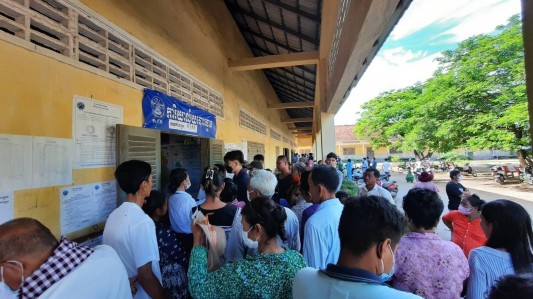
 Facebook
Facebook Twitter
Twitter